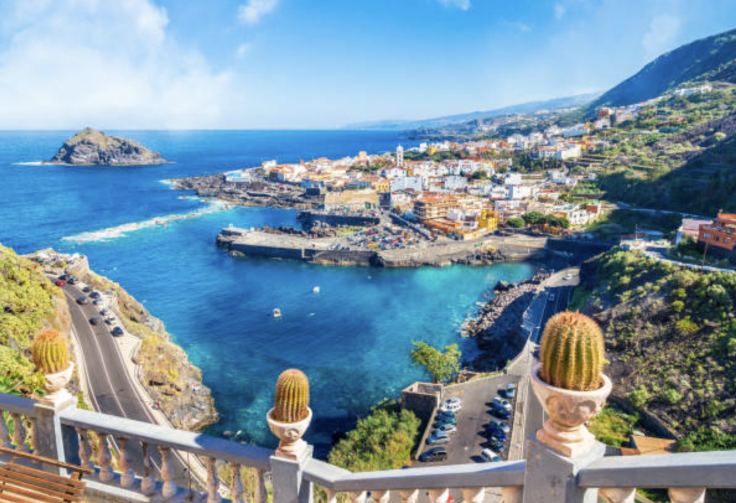Spain's 'Tourist Ban' Will Not Affect Britons Too Much: You Can Still Visit, But Here's What You Need To Know
Due to overtourism, there have been several mass protests across Spain

For Britons, Spain has long been the go-to destination. With its sunny beaches, vibrant cities, and rich culture drawing millions each year, it's easy to see why it's a favourite travel spot.
In fact, the tourism sector in Spain set a new visitor record with 94 million tourists in 2024, many of whom were from the United Kingdom. While tourism generates a substantial economic boost of £108.36 ($133.73) in Spain, it also raises significant problems, such as excessive visitation, rising house prices, and overburdened community resources.
Due to overtourism, there have been several mass protests across Spain, including in the Canary Islands. Locals are calling for tougher tourism regulations.
The Problem of Overtourism
Reports indicate that a third of Spanish people are frustrated because their local area is filled with international tourists. Speaking to a local newspaper, a resident said, 'We want people to be civil and understanding and, if they see that there is no parking space, to leave, as we all have to do in any city.'
In response to the expanding worries, Spanish authorities have launched new measures to gain control of this rising issue. This month, Malaga, a favourite among British holiday makers, implemented a new measure that some call a 'tourist ban.'
However, the name is misleading. The law doesn't stop tourists from visiting the city. Instead, it prevents the registration of new holiday rentals in 43 of Malaga's most popular districts.
While this might sound concerning to Britons who love the city, these new restrictions will unlikely disrupt your travel plans. Here's everything you need to know about the latest restrictions and how they could affect your next Spanish holiday.
Malaga Bans New Holiday Rentals: What Does It Mean for the UK?
In a recent development, Malaga, a key destination on Spain's Costa del Sol, has banned the registration of new holiday rentals in 43 districts.

The new and significant measure went into effect on 14 January. It aims to tackle the growing issue of over-tourism by curbing the number of short-term rental properties that crowd out residents and overwhelm Malaga's already busy districts.
Now, for UK tourists, there is no need to panic. You can still book Airbnb, hotels, and other types of accommodation across Malaga and all 43 affected districts. The city reportedly already has over 13,000 officially registered holiday rentals, which will remain unaffected by the new guidelines.
The main change is that new holiday rental properties—specifically those without independent access—will be prevented from registering. However, it would be a good idea to double-check whether the accommodation where you plan to stay is impacted.
Rental licences for properties without separate access and resources will be cancelled from 22 February, so check for updates from your host or booking platform.
Other Spanish Cities Introduce Similar Bans
Malaga isn't the only city in Spain cracking down on short-term rentals.
Over the past 12 months, Alicante and Madrid have introduced similar bans to manage tourism numbers. Other cities like Seville are expected to follow suit. Spain's efforts to address over-tourism aim to reduce the strain on local infrastructure, housing markets, and the environment—issues that have become increasingly vocal in Spain's major tourist destinations.
While these measures safeguard residents, visitors can still experience Spain's cultural landmarks and beautiful coastline. Travellers can book hotels, registered rental properties, apartments, and other accommodations throughout the country's most popular tourist destinations.
Increased Paperwork for UK Tourists in 2025
The updated rental regulations probably won't impact UK visitors' travel choices, but they need to understand the new documentation requirements for Spain this year.

The Interior Ministry of Spain established a new regulation which requires visitors to submit comprehensive booking information for accommodations and vehicle rentals. You must provide all your data, including bank card information, alongside residence particulars and details about family bonds between each other.
This move, which took effect late last year, has stirred criticism. Many visitors have expressed disappointment, as the additional paperwork could make the process more time-consuming.
However, the Spanish government said it had introduced the new rule to combat criminals operating within the tourism industry, and it is likely to stay in place for the foreseeable future. To prevent delays, be ready to give this information when booking a reservation.
New Laws in Spain Tourists Should Know About
If you dream of buying a holiday home or permanent residence in Spain, the prices will be slightly higher for UK residents.
According to the latest reports, the Spanish government has introduced a new tax law that requires non-EU buyers, including Brits, to pay 100% tax on property purchases. Prime Minister Pedro Sánchez announced this change earlier this month as part of a larger effort to address the country's ongoing housing crisis, which has frustrated locals and foreigners looking to invest.
However, you should expect to pay more if you intend to book a holiday rental. Spain is also increasing taxes on short-term rentals, so your regular Airbnb or vacation home could see a bump in cost. It's one move aimed at helping the housing market but which might, in turn, affect your travel budget.
And if you've planned a late-night swim on the beaches of Benidorm, you might need to rethink that idea.
A new law now forbids anyone from stepping onto the beach or swimming between midnight and 7 am. So, if you were hoping for a peaceful midnight dip, you'd be out of luck. Those caught breaking the rule could face hefty fines ranging from £650 to £1,020, so it's best to stick to daylight hours for your beach adventures.
Are Other Countries Also Tackling Overtourism?
The curb on tourists flow is not just limited to Spain, many popular tourist destinations are now introducing stricter measures to tackle overtourism and its negative impacts.

Italy, for example, has proposed a £21.25 tax on the priciest hotel rooms, and Venice will charge a £4.25 fee for daytrippers visiting the historic centre. Portofino is fining tourists £233.75 for obstructing pedestrian areas, while Rome has banned topless sunbathing and messy food near attractions.
Sardinia, known for its serene tourist points, has implemented steep fines for disturbing its protected beaches, and Florence has banned short-term rentals in its historic centre.
In Greece, Athens is limiting the number of Acropolis visitors to 20,000 daily, while Santorini and Mykonos are reducing the number of cruise ships.
Meanwhile, Bali has introduced a £8.20 tourist tax to curb disruptive behaviour, and Japan's Okinawa is capping visitors to preserve wildlife. Amsterdam limits river cruises and imposes hotel construction bans to control visitor numbers.
Will These Restrictions Affect Your Spain Trip?
Despite these new rules, Spain remains a majestic destination for British travellers, with its Mediterranean beaches, rich history, and world-class food. For Britons heading to Malaga or other parts of Spain, staying informed about these changes is essential.
Holiday rental bans are unlikely to prevent travellers from booking their usual accommodation. Although the additional paperwork may require more time during travel preparations, it is unlikely to disrupt holiday plans significantly.
For those planning to visit Spain in 2025, staying informed about the latest requirements and monitoring booking updates will be essential.
© Copyright IBTimes 2025. All rights reserved.





















